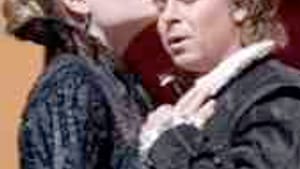Stay in the Loop
BSR publishes on a weekly schedule, with an email newsletter every Wednesday and Thursday morning. There’s no paywall, and subscribing is always free.
Little details make a big difference
The Met's "Don Carlo': The high-def screen version

When I saw the Metropolitan Opera's Don Carlo in high-definition transmission at my neighborhood movie theater last weekend, I found more to report than the normal discussion about camera angles.
This time the singing was markedly different. Better than when I saw the production in the opera house on November 26 (read my review here). This is attributable to the approaches of the tenor, Roberto Alagna, and the conductor, Yannick Nézet-Séguin.
I've heard Alagna talk about how he scales down his acting when he's on the big screen, trying to be subtler. I didn't hear him say anything about scaling down his singing— but it's clear that he has done that too. Alagna sang softer, and he displayed superb control of vocal placement. I heard none of the occasional flatness that marred his November performance.
Nézet-Séguin spoke about how he likes to improvise and work with singers as if they're making chamber music, and that too was evident in the HD performances. (No changes of notes, but adjustments of pacing and phrasing.)
Bass Ferruccio Furlanetto was excellent as King Philip in November; now he was even better. He whispered some of his words, like "guarda," as he warned Rodrigo to beware of the Grand Inquisitor, and also in his aria "Ella giamai m'amo" ("She never loved me") as he talked to himself while half asleep. The quiet interplay in this aria between Furlanetto and the orchestra's cellist was breathtaking.
Anna Smirnova, as Princess Eboli, also was decidedly better on screen. Leading lady Marina Poplavskaya was more effective, too, because her flaws aren't as crucial in the high-definition TV medium. As I noted earlier, Poplavskaya is not a full dramatic soprano with a soaring top and rich, dark bottom— but that matters less when her voice is amplified electronically in high-def. Her high passages were really lovely.
As for techniques used by the video director, numerous close-ups of faces revealed character and personality. Also, only on the cinema screen could audiences notice details such as whose portrait is in Elisabetta's jewel box— which is crucial to the plot.
Especially powerful was the long soliloquy for King Philip and his subsequent confrontation with the Grand Inquisitor, ending with the king's lament: "Why must the crown always bow to the altar?"
This time the singing was markedly different. Better than when I saw the production in the opera house on November 26 (read my review here). This is attributable to the approaches of the tenor, Roberto Alagna, and the conductor, Yannick Nézet-Séguin.
I've heard Alagna talk about how he scales down his acting when he's on the big screen, trying to be subtler. I didn't hear him say anything about scaling down his singing— but it's clear that he has done that too. Alagna sang softer, and he displayed superb control of vocal placement. I heard none of the occasional flatness that marred his November performance.
Nézet-Séguin spoke about how he likes to improvise and work with singers as if they're making chamber music, and that too was evident in the HD performances. (No changes of notes, but adjustments of pacing and phrasing.)
Bass Ferruccio Furlanetto was excellent as King Philip in November; now he was even better. He whispered some of his words, like "guarda," as he warned Rodrigo to beware of the Grand Inquisitor, and also in his aria "Ella giamai m'amo" ("She never loved me") as he talked to himself while half asleep. The quiet interplay in this aria between Furlanetto and the orchestra's cellist was breathtaking.
Anna Smirnova, as Princess Eboli, also was decidedly better on screen. Leading lady Marina Poplavskaya was more effective, too, because her flaws aren't as crucial in the high-definition TV medium. As I noted earlier, Poplavskaya is not a full dramatic soprano with a soaring top and rich, dark bottom— but that matters less when her voice is amplified electronically in high-def. Her high passages were really lovely.
As for techniques used by the video director, numerous close-ups of faces revealed character and personality. Also, only on the cinema screen could audiences notice details such as whose portrait is in Elisabetta's jewel box— which is crucial to the plot.
Especially powerful was the long soliloquy for King Philip and his subsequent confrontation with the Grand Inquisitor, ending with the king's lament: "Why must the crown always bow to the altar?"
What, When, Where
Don Carlo. Opera by Giuseppe Verdi; directed by Nicholas Hytner directed; Yannick Nézet-Séguin, conductor. Through December 18, 2010 at Metropolitan Opera, Lincoln Center, Broadway and 65th St., New York. Live high-definition transmissions to movie theaters December 11, 2010, with U.S. encore January 5, 2011 and Canadian encores January 22 and February 14, 2011. www.metoperafamily.org.
Sign up for our newsletter
All of the week's new articles, all in one place. Sign up for the free weekly BSR newsletters, and don't miss a conversation.

 Steve Cohen
Steve Cohen